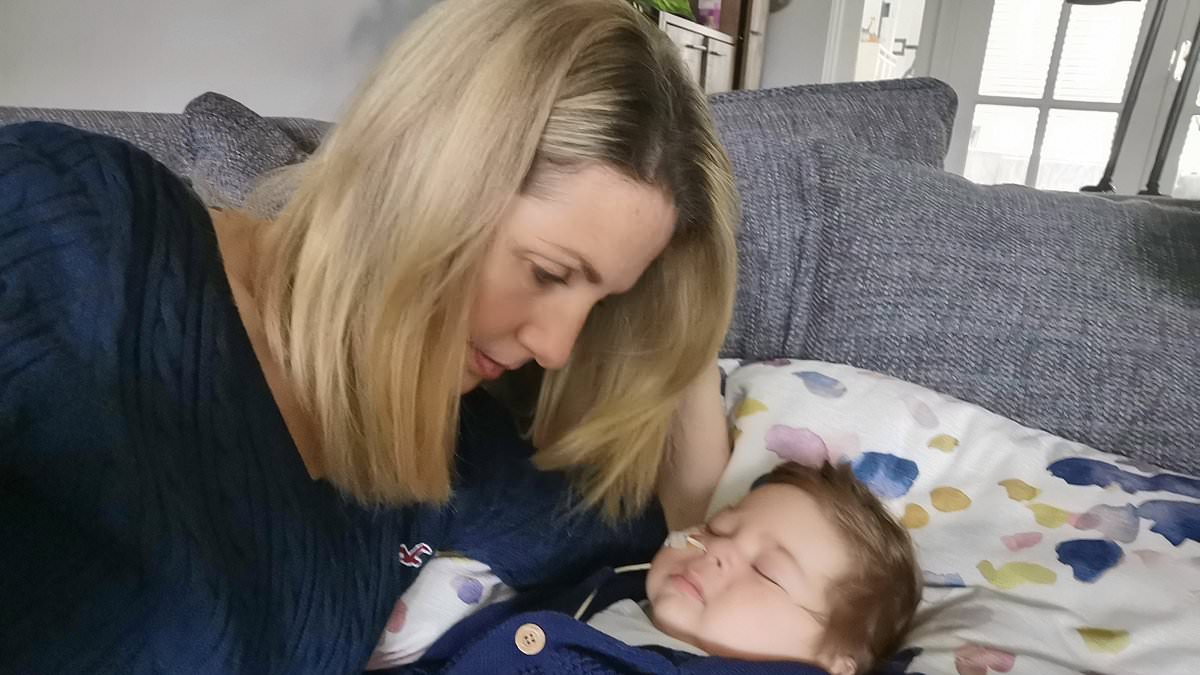A grieving mother has called for routine testing for group B streptococcal bacteria in expectant women after her baby suffered catastrophic brain damage and died when he contracted the infection.
Louise Martin raised concerns within two hours of Joshua’s birth over his grunting noises, struggling to maintain body temperature and lack of interest in feeding – all red flags for the life-threatening condition.
But she was sent home and made two further calls to the Lister Hospital in Stevenage, Hertfordshire, before Joshua, who had become ‘floppy and cold’, was readmitted.
He was taken to neonatal intensive care where he was diagnosed with GBS infection and managed to survive – only to die in his mother’s arms eight months later from respiratory failure linked to the severe brain injury he sustained.
His devastated parents have now been awarded an undisclosed sum from the hospital trust more than three years after the tragedy.
But they pointed out he would still be alive today – and other babies could be saved – if a routine test was available for the common birth infection.
Mrs Martin, 39, said: ‘The pain of losing Joshua is still as raw now as it was then. We loved him so much.
‘I believe that Joshua would still be here with us and experiencing a happy, healthy life if the GBS infection was diagnosed earlier.
‘It was only after researching more about it that I realised how common GBS is. It’s difficult to understand why more isn’t done to identify and prevent it causing infection.’
Around a quarter of women carry the Strep B bacterium, generally with no ill-effects. But they can pass it on to their babies around birth, leading to serious problems.
NHS data suggests around one in 1,750 babies fall seriously ill after contracting the infection, with a death rate of about ten per cent.
But a study by the University of Cambridge and Cambridge Universities NHS Foundation Trust last year found one in 200 newborns are admitted to neonatal units with sepsis caused by GBS.
Mrs Martin, of Hitchin, Hertfordshire, was admitted to hospital on New Year’s Eve 2020 and gave birth at 6am the next day after being induced.
She said she overheard doctors discussing whether she needed antibiotics but was allowed home on January 2, despite her concerns about Joshua’s problems.
The mother-of-two daughters aged seven and 11 called the hospital that night but was told there was nothing to be worried about.
Joshua failed to wake up for a feed during the night and was readmitted on January 3 when his mother complained he had become limp and cold. He was put on a ventilator after tests showed he had GBS meningitis.
Doctors discharged him after six weeks and he spent time in a hospice before being allowed home but lived with severe complications, dying in September 2020.
Mrs Martin, who wants routine tests for Strep B for mothers towards the end of pregnancies, said: ‘He became very weak and when he eventually lost his fight at home, surrounded by his family, it was devastating for us all.’
She added: ‘Each time I tried to raise concerns, I was told there was nothing to worry about. Even when we were sent home, I felt something wasn’t right.
‘While it’s too late for Joshua, I just hope that by speaking out I can help raise awareness around GBS.
‘If I can help others by sharing what happened to our family, then maybe Joshua’s death won’t have been totally in vain.
‘I wasn’t advised about GBS in any of my other pregnancies and the only thing I remember during my pregnancy with Joshua was a midwife asking at an antenatal appointment if I’d previously been diagnosed with GBS, which I hadn’t.
‘I didn’t know what GBS was at the time, so I didn’t think more of it.’
She added she had ‘always been nervous during my pregnancies’ after her first child was stillborn due to a blood clot on his brain. Subsequent pregnancies were classed as high-risk as a result.
East and North Hertfordshire NHS Trust, which runs Lister Hospital, did not admit liability in the financial settlement but an investigation it carried out revealed ‘inappropriate’ management and communication in Joshua’s case.
It said in a statement: ‘Our midwives follow national and local guidance for Strep B and, through this guidance, ensure the risks – and how to test for them – are discussed antenatally through our community midwives.
‘If this was not the experience of Louise and her family, our chief nurse would welcome discussions of how to improve our practice and safety outcomes and would encourage them to get in touch.’
Alexandra Highfield, of law firm Irwin Mitchell who represented the family, said: ‘A simple test can be conducted to highlight whether an expectant mum is a carrier of the bacteria and her care plan can be adjusted to ensure intravenous antibiotics are provided throughout labour to prevent the baby developing an infection.
‘What happened to Joshua vividly highlights the dangers of GBS infection and the need for everyone to be aware of the signs and symptoms.’
Jane Plumb MBE, chief executive of charity Group B Strep Support, added: ‘Understanding group B strep and the availability of antenatal testing can make a life-changing difference.
‘Knowledge is power and, in the case of group B strep, it is a vital tool that can prevent tragedies like the loss of Joshua.’
